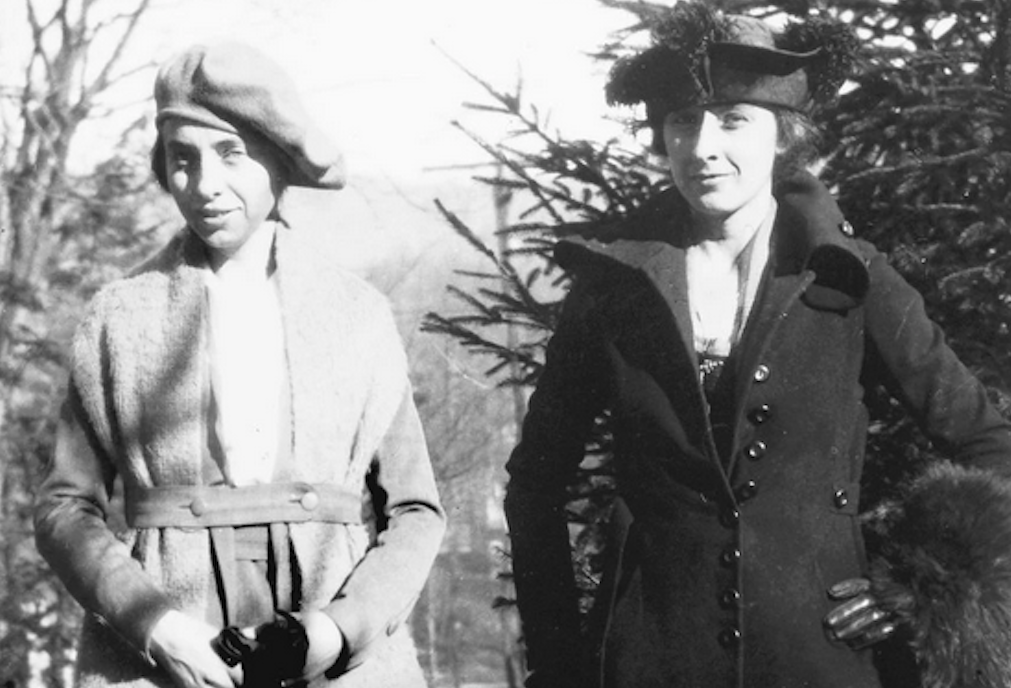By Lynn Burnett
Born in the 1890’s, Grace and Katharine Du Pre Lumpkin were raised by a resentful father from a once prominent slave-holding family. After the Civil War, the Confederate veteran joined the original Ku Klux Klan. As children, the sisters witnessed their father mercilessly beating the family’s Black servants. Although they were raised in an atmosphere of hardcore White supremacy, it was the awful witnessing of their father’s violence that led the sisters to have their first doubts about racial injustice.
After high school, the sisters attended an all-women’s college in Georgia. Although they were in the Deep South during the height of Jim Crow, it was also the Progressive Era: labor and women’s rights were much discussed, as was education reform, often through the lens of a Progressive Christianity. As has been true for other White southern women like Anne Braden, having the opportunity to attend college – and especially a women’s college – became the first opportunity for the Lumpkin sisters to be exposed to different ideas than those they were raised with.
When Katharine joined the Young Women’s Christian Association, she was shocked to hear that a Black woman was going to address the group. Afterwards, however, she realized that “the heavens had not fallen, nor the earth parted asunder to swallow us up in this unheard of transgression”. She began to question the racial beliefs she was raised with, and made further experiments with crossing the color line. Each time she did, not only did it not feel wrong… it felt right. She soon joined efforts to desegregate the YWCA. Inspired by her own discovery, she worked to create spaces for interracial contact within the YWCA – such as interracial study groups and conferences – with the hope that other White women would have the same experience she had. Many of them did: and because they had supportive community through the YWCA, these women were not faced with the severe isolation some other White dissenters from segregation faced. This allowed them to stay in the work of challenging segregation, even though it was the 1920s and the Klan was at the height of its powers.
Grace, meanwhile, joined picket lines, and was arrested at a protest supporting the anarchists Sacco and Vanzetti. She published a piece in a Black newspaper titled “Why I as a White Southern Woman Will Vote Communist.” Soon, she grew into a literary star of the Left. In 1929 she worked with the Communist Party to organize Black sharecroppers in the South. Grace, however, grew deeply disillusioned with Communism after experiencing harsh party discipline and threats meant to keep her in line. She became an FBI informant to help take the Party down. Grace’s backlash against Communism – which supported racial justice – may have been what led her to reverse her racial beliefs as well: during the civil rights movement, the woman who once fought for Black sharecroppers now supported segregation.
While Grace was diving deeper into radical labor movements, Katharine studied sociology in Northern universities, which continued her antiracist trajectory. As she recalled, “Until now, it came over me, I had never studied the South. I had never ‘gone to the sources,’ ‘checked facts against hearsay,’ sorted out ‘unbiased from biased history’ . . . I began to doubt my own characterizations.” In her memoir, “The Making of a Southerner,” Katharine describes her process of breaking away from her upbringing… and uses as source material her family’s own slave inventories and Klan records. By showing how far she had moved from her roots, she hoped to model the possibility for others. During the civil rights movement, as a sociology professor Katharine taught a class contextualizing and analyzing the events unfolding before the eyes of the students. When Stokely Carmichael initiated the Black Power movement in the late 60s, she wrote to him expressing her support.
Additional Resources
Books
Katharine Du Pre Lumpkin.The Making of a Southerner.
Jacquelyn Dowd Hall. Sisters and Rebels: A Struggle for the Soul of America.
Articles
Tony Horwitz: The Daughters of the Confederacy Who Turned Their Heritage to Political Ends.
New Georgia Encyclopedia entry.
Wikipedia entry.
Videos & Podcasts
Audio interview with historian Jacquelyn Dowd Hall.
